Unit 13 The water planet教学设计
- 格式:doc
- 大小:32.31 KB
- 文档页数:18
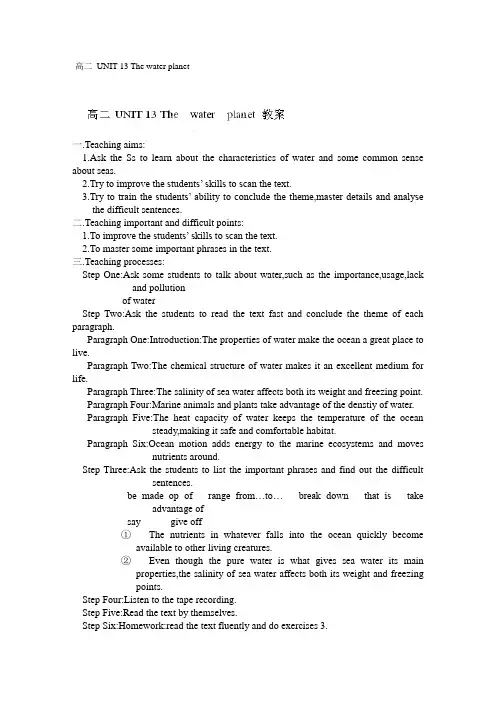
高二UNIT 13 The water planet一.Teaching aims:1.Ask the Ss to learn about the characteristics of water and some common sense about seas.2.Try to improve the students’ skills to scan the text.3.Try to train the students’ ability to conclude the theme,master details and analysethe difficult sentences.二.Teaching important and difficult points:1.To improve the students’ skills to scan the text.2.To master some important phrases in the text.三.Teaching processes:Step One:Ask some students to talk about water,such as the importance,usage,lack and pollutionof waterStep Two:Ask the students to read the text fast and conclude the theme of each paragraph.Paragraph One:Introduction:The properties of water make the ocean a great place to live.Paragraph Two:The chemical structure of water makes it an excellent medium for life.Paragraph Three:The salinity of sea water affects both its weight and freezing point.Paragraph Four:Marine animals and plants take advantage of the denstiy of water.Paragraph Five:The heat capacity of water keeps the temperature of the ocean steady,making it safe and comfortable habitat.Paragraph Six:Ocean motion adds energy to the marine ecosystems and moves nutrients around.Step Three:Ask the students to list the important phrases and find out the difficult sentences.be made op of range from…to… break down that is take advantage ofsay give off①The nutrients in whatever falls into the ocean quickly becomeavailable to other living creatures.②Even though the pure water is what gives sea water its mainproperties,the salinity of sea water affects both its weight and freezingpoints.Step Four:Listen to the tape recording.Step Five:Read the text by themselves.Step Six:Homework:read the text fluently and do exercises 3.。
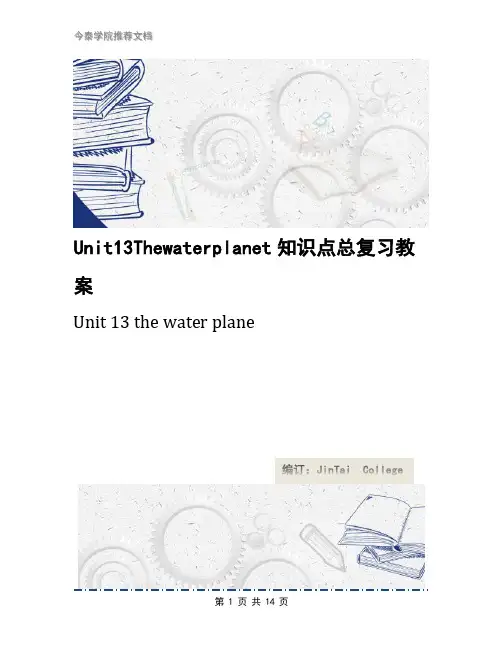
Unit13Thewaterplanet知识点总复习教案Unit 13 the water planeUnit13Thewaterplanet知识点总复习教案前言:小泰温馨提醒,英语作为在许多国际组织或者会议上都是必需语言,几乎所有学校选择英语作为其主要或唯一的外语必修课。
英语教学涉及多种专业理论知识,包括语言学、第二语言习得、词汇学、句法学、文体学、语料库理论、认知心理学等内容。
本教案根据英语课程标准的要求和针对教学对象是高中生群体的特点,将教学诸要素有序安排,确定合适的教学方案的设想和计划、并以启迪发展学生智力为根本目的。
便于学习和使用,本文下载后内容可随意修改调整及打印。
高二英语unit13 the water planet知识点总复习教案section iii 词汇、语法、综合技能20.if he played a bad trick on you, the managerwould say you were the thief and call in the police. 如果他捉弄你的话,经理就会说你是小偷,并报警。
(p.22 ex.2 倒数3-2行)▲play a trick on意为“捉弄”“开玩笑”,也可以说play sb. a trick。
如:① he played her a bad trick by taking all her money. 他跟她开了个恶劣的玩笑,把她的钱全拿去了。
② it never occurred to me that they were playing a trick on me.我从未想到他们是在捉弄我。
③ they played a thousand tricks on him.他们千方百计地欺骗他。
④ they are playing harmless tricks on one another.他们正彼此毫无恶意地恶作剧。
▲call in作“找来”“请来”解,通常是指请医生或警察。

矿产资源开发利用方案编写内容要求及审查大纲
矿产资源开发利用方案编写内容要求及《矿产资源开发利用方案》审查大纲一、概述
㈠矿区位置、隶属关系和企业性质。
如为改扩建矿山, 应说明矿山现状、
特点及存在的主要问题。
㈡编制依据
(1简述项目前期工作进展情况及与有关方面对项目的意向性协议情况。
(2 列出开发利用方案编制所依据的主要基础性资料的名称。
如经储量管理部门认定的矿区地质勘探报告、选矿试验报告、加工利用试验报告、工程地质初评资料、矿区水文资料和供水资料等。
对改、扩建矿山应有生产实际资料, 如矿山总平面现状图、矿床开拓系统图、采场现状图和主要采选设备清单等。
二、矿产品需求现状和预测
㈠该矿产在国内需求情况和市场供应情况
1、矿产品现状及加工利用趋向。
2、国内近、远期的需求量及主要销向预测。
㈡产品价格分析
1、国内矿产品价格现状。
2、矿产品价格稳定性及变化趋势。
三、矿产资源概况
㈠矿区总体概况
1、矿区总体规划情况。
2、矿区矿产资源概况。
3、该设计与矿区总体开发的关系。
㈡该设计项目的资源概况
1、矿床地质及构造特征。
2、矿床开采技术条件及水文地质条件。
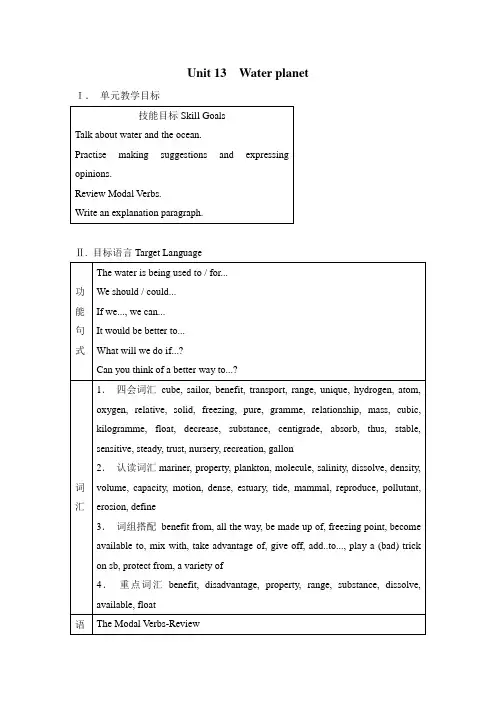
Unit 13 Water planet I.单元教学目标Ⅱ. 目标语言Target LanguageⅢ.教材分析与教材重组1.教材分析本单元以Water Planet“水的星球”为话题, 但课文主要谈论的是The water on the planet where the human beings live,“星球(地球)的水”。
通过本单元教学,学生利用所学英语知识,同时联系其他学科所学知识,了解水的特性、化学结构,还了解海水(咸水)的盐度、密度、热容度以及大洋的运动等科学知识。
通过本单元的学习,学生不仅可以了解到英语(科技)说明文的特点和写作手法,还可以体会到英语的实用价值,从而激发学生学习英语的兴趣。
在学习过程中,应通过给学生布置“任务”,如查阅书籍、上网搜索、小组合作来开发学习资源,拓展主题内容,加深相关题材学习。
教师可提前指导学生利用挑好的部分网站辅助学习。
1.1 WARMING UP 通过几个试验来让学生观察并了解水和其他一些物品放在一起时的一些现象和变化,并通过问题引导学生了解水的特性和重要性。
同时还使学生联想所学过的关于地球水污染和保护的知识话题。
此“热身”活动不仅可练习学生的动手、观察和英文表达能力,也为READING的学习做好铺垫。
1.2 LISTENING 是一首关于海洋中的生命的英文诗歌,讲述航海探险中的一个故事,使学生了解人类和海洋的关系。
1.3 SPEAKING 是学生“双人”交际活动。
要求同学阅读几幅描述人类如何使用水的图画,每组同学选择其中一幅,利用所提供问题或自己设计的问题,讨论使用和保护水的重要性。
1.4 PRE-READING 是READING的热身活动。
目的在于练习学生根据主题设计内容和问题的能力,是阅读和写作的基本技能。
要求学生不阅读课文,只看各段的标题,挑出各段的主题并用所给出的结构提出六个问题,然后与同伴或同组的同学回答这些问题,写下答案和各人所知的关于各话题的知识。
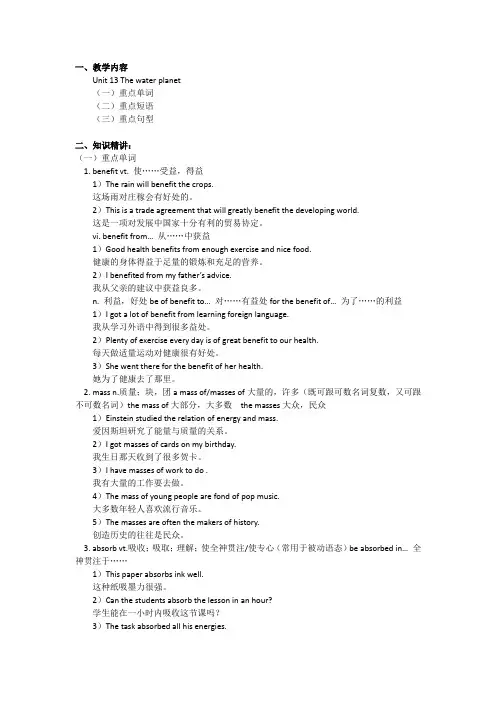
一、教学内容Unit 13 The water planet(一)重点单词(二)重点短语(三)重点句型二、知识精讲:(一)重点单词1. benefit vt. 使……受益,得益1)The rain will benefit the crops.这场雨对庄稼会有好处的。
2)This is a trade agreement that will greatly benefit the developing world.这是一项对发展中国家十分有利的贸易协定。
vi. benefit from… 从……中获益1)Good health benefits from enough exercise and nice food.健康的身体得益于足量的锻炼和充足的营养。
2)I benefited from my father’s advice.我从父亲的建议中获益良多。
n. 利益,好处be of benefit to… 对……有益处for the benefit of… 为了……的利益1)I got a lot of benefit from learning foreign language.我从学习外语中得到很多益处。
2)Plenty of exercise every day is of great benefit to our health.每天做适量运动对健康很有好处。
3)She went there for the benefit of her health.她为了健康去了那里。
2. mass n.质量;块,团a mass of/masses of大量的,许多(既可跟可数名词复数,又可跟不可数名词)the mass of大部分,大多数the masses大众,民众1)Einstein studied the relation of energy and mass.爱因斯坦研究了能量与质量的关系。
2)I got masses of cards on my birthday.我生日那天收到了很多贺卡。
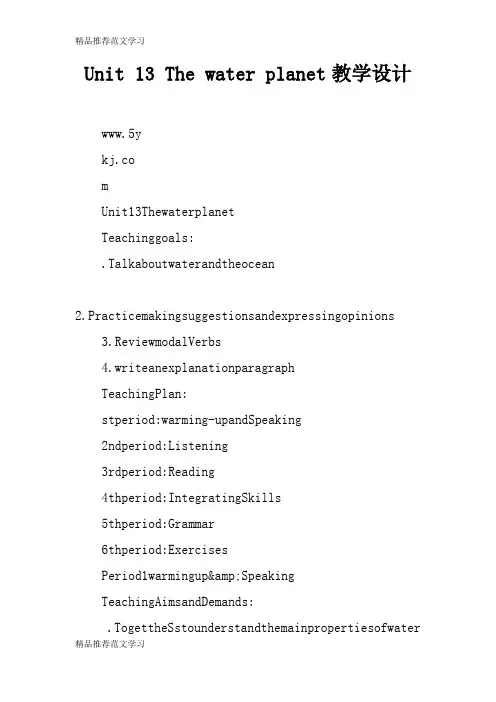
Unit 13 The water planet教学设计www.5ykj.comUnit13ThewaterplanetTeachinggoals:.Talkaboutwaterandtheocean2.Practicemakingsuggestionsandexpressingopinions3.ReviewmodalVerbs4.writeanexplanationparagraphTeachingPlan:stperiod:warming-upandSpeaking2ndperiod:Listening3rdperiod:Reading4thperiod:IntegratingSkills5thperiod:Grammar6thperiod:ExercisesPeriod1warmingup&SpeakingTeachingAimsandDemands:.TogettheSstounderstandthemainpropertiesofwaterbyconnectingthemwithsomecommonphenomenaandlearningt oexplainthephenomena.2.Toenablethemtobeawareoftheimportanceofwater,makin ggooduseofwaterinaproperwayandprotectingwaterresour ces.TeachingDifficultPoint:Talkabouthowtousewaterandprotectit.TeachingAids:Somewater,someoilandaglass;blackboardandmultimedia TeachingProcedures:Step1.Lead-inAsktheSssomequestionsasfollowsT:waterisaroundusandinsideus.wecan’tgowithoutwater.Qs:whyiswatersoimportanttolivingthings?canyoupointoutsomeofitspropertiesorcharacteristics?Suggestedvocabulary:It'scolorless,tasteless,odorlessanduniversaldissolv ent.Itfeelswet;Itexistsinthreeforms:liquid,solid,gas,andiscycledth roughthewatercycle;Itcanabsorbalargeamountofheat;Itstickstogetherintobeadsordrops;It'spartofeverylivingorganismontheplanet;etc.Askstudentsthenamesofoceansandcontinents:ThePacific ocean,theAtlanticocean,theIndiaocean,theArcticocean ;Asia,Africa,Europe,theNorthAmerica,theSouthAmerica ,Antarctica,oceaniaStep2.warmingupUsethewater,theoilandtheglasstodothreeexperiments.Learnmoreaboutwater’spropertiesbydoingsomesimpleexperimentsandlearntode scribeanexperiment.whatpropertyofwaterdoeseachofthefourexperimentsillustrate?whatcausesthisphenomenon?what’sthisphenomenonrelatedto?①Experiment1showshowairpressurecausesapieceofthickpa pertoclingtoanupturnedglassofwater.②Experiment2illustrateshowsubstanceswithdifferentden sitybehavewhenplacedinthesamecontainer.③Experiment3isanexampleofhowwaterdissolvessubstances andobjects.④Experiment4illustratessomeofthedifferencesbetweensa ltwaterandfreshwater.Step3.Speaking.Pre-speaking)Doyouagreewiththesaying “withoutwater,lifewouldnotexist.”?2)SonotonlyyouandIagreewiththisopinion,butalsotheUn itedNationsholdthesameview.Andthat’swhywehaveworldwaterDay.Q:Isthereanyonewhoknowswhenitis?-mar.223)BriefbackgroundinformationaboutworldwaterDay:worl dDayforwaterisestablishedbytheUnitedNationsGeneralA ssembly'sresolution47/193of22December1992.Itisauniq ueoccasiontoremindeverybodythatconcreteeffortstopro videcleandrinkingwaterandincreaseawarenessworld-wid eoftheproblemsandofthesolutions,canhelpmakethediffe rence.4)Lastyearwewitnessedsomegreatdisasterssuchasthetyp hoon“yunna”andthetsunamiintheIndiaocean.whatacoincidencethatth ethemeforworldwaterDayXXwas“waterandDisaster”.worldwaterDayXXwillbeguidedbyt heupcomingwaterdecade'stheme"waterforLife".Itwillbe thestartingdayforthisInternationalDecadeforAction," waterforLife".2.while-speaking)Tosomeextent,theexistenceofworldwaterDayalsoim pliesthathumanbeingscannotlivewithoutwater.why?canyoutellhowwaterisbeingusedinourlife?Givesomeexamples.-Electricity,agriculture,homeuse,industry,transport, entertainment,etc.2)Lookatthefirstpictureinthetextbookandtalkaboutit.Thewaterisbeingusedtogenerateelectricity.Buildingup behindahighdam,wateraccumulatespotentialenergy.This istransformedintomechanicalenergywhenthewaterrushes down.Itisagoodwaytousewaterbecausewaterisrenewableg reenenergy.Itwillneverrunoutifonlyweuseitproperlyan dgeneratingelectricitybyusingwaterisabetterwaytopro tecttheenvironmentthanothers.However,ittakesagreats umofmoneyandalongperiodoftimetobuildadamandpreparea lltherequiredequipment.Sincenowadayselectricityhasa lreadybeenanindispensablepartofourlife,mostpeoplebe nefitfromusingwaterinthisway.3)Groupwork.Dividestudentsintoseveralgroupswithsixi neach.Eachonetakeschargeofonepicture.whendiscussingeachpicture,pleasethinkaboutthefollow ingquestions:Howiswaterbeingused?whatpropertyofwaterenablesittobeusedinthisway?whydoweusewaterinthisway?whobenefitsfromusingwaterinthisway?Isthisagoodwaytousewater?whataresomedisadvantagesofusingwaterinthisway?4)Pairwork.Eachsix-membergroupcanbedividedintothree smalleroneswithtwoineach.makeadialogueonthebasisoft heresultsaboutyourtopicswereach,usingfollowingusefu lexpressions:Thewaterisbeingusedto/for…weshould/could…whatwillwedoif…?Ifwe…,wecan…Itwouldbebetterto…canyouthinkofabetterwayStep4.Homework:Recitethenewwordsandexpressionsinthisunit.Period2ListeningTeachingAimsandDemands:ListentothetapeandimprovetheSs’abilitytolistentopoemsandstories.TeachingDifficultPoint:Graspthemainideaofthepoembylisteningtothetape...TeachingAids:Ataperecorder,theblackboardTeachingProcedures:Step1.Pre-listeningGiveaverybriefintroductionofTheRimeoftheAncientmari neranditsauthorSamuelTaylorcoleridge.Hererimeisthev ariantofrhyme.Step2.while-listeningListentothestoryandfindtheinformationaboutit.when:18thcentury?where:onashipwho:sailors/marinerswhat:oneofthesailorskillsabirdthatbringsgoodlucktot heship,bydoingwhichhehasbroughtbadluckanddeathtothesailors.Listentopart1forthesecondtimeandfinishthefollowingt rueorfalsequestions.ThispoemwaswrittenbyaBritishpoetSamuelTaylorcolerid geinthe1700s.Inthepoem,oneofthesailorskillsafishundertheship.Itisbelievedthattheanimalhekillsisonethatbringsgood lucktotheship.othersailorsaresofrightenedandangrythattheykillthes ailor.Thesailorsareextremelythirstybuttheycan’tdrinkthewaterinthesea,becauseitistoodirty.Listentopart1forthethirdtimeandanswerthefollowingqu estions:whotellsthestoryinthepoem?whatdoesoneofthesailorsdo?whatdoyouthinkwillhappennext?whyaretheothersailorsfrightened?Listentopart2andcompletethefollowingsentences.Finallytheydecidethathemustdie-_______themarinerwho_______thebird.Hemust____________itallandwill______byhavingtotellt hestory…___________ontheship,_________ontheocean,themariner suffersfrom_______and______.Hisstory_____,the________marinersays_________andask sthemtolearnfromhis___________.keys:1)except,shot;2)livethrough,pay3)Leftalone,drifting,loneliness,fear;4)told,ancient,farewell,sufferingsListentopart2againandanswerthefollowingquestions: whathappenstothesailors?whathappenstothemariner?whyisthepersontellingthestory?whoisthepersonactually?Step3.Post-listeningReflection:whatdoyoulearnfromthisstory?-Everythingexistingintheworldhastheirowncertainvalue s,weshouldunderstandandrespectthem.creationworkwithpartnerandtrytocomeupwithagood,scarystoryli ketheoneaboutthemariner.Step4.HomeworkThinkasmanyexamplesaspossibletoillustratewaterprope rties.Period3ReadingTeachingAimsandDemands:.TohelptheSslearnsomelanguageknowledge,patterns andlanguageitemsaswellasscienceknowledge.2.TodeveloptheSs’abilityofreadingcomprehensionthroughreadingactivities.3.TohelptheSsunderstandwhywaterissoimportanttousand whatwecandotoprotectwater.TeachingDifficultPoint:.Understandeachpartofthepassage.2.TohelpimproveSs’communicativeskillsbyintroducingtheproperuseof “modalverbs”.TeachingAids:Arecorder,someslidesTeachingProcedures:Step1:LeadinAsksomequestionstomakestudentsgettoknowsomethingabo utwater.Step2.FastReadingSsreadtheboldwordsinthepassageandunderstandthestruc tureofthepassage.Howmanypartsarethereinthepassage?Ssreadandgetthemainideasofeachpart.Part1:thepropertiesofwater;Part2:chemicalstructureofwater---H2oPart3:salinity-----thepercentageofsalt.Part4:DensityPart5:heatcapacityPart6oceanmotionStep3.carefulReadingReadthepassagecarefullyandanswerthefollowingquestio ns..whatarethepropertiesofwater?waterispolar.waterisliquidatroomtemperature.waterhasarelativelyhighfreezingpoint.waterhasdensity1,000kg/m3.waterhashighheatcapacity.…2.whatcauseswatertohavesuchuniqueproperties?-Itsmoleculeform/chemicalstructure.3.whatiswatermoleculelike?chemicalstructure:twohydrogenatomsandoneoxygenatom.Differentpartsofit:aslightlypositiveendandaslightly negativeend,soitispolar.Thefunctionofit:itcauseswatertobeabletodissolveboth solidsandgases,andthat’swhywatercanbreakdownnutrientsquickly.4.Dopurewaterandsaltwaterhavethesamechemicalstructu re?Doespurewaterhavesalinity?Qs:1)what’ssalinity?2)whatissea/saltwater?-Amixtureofpurewater,dissolvedgasesandsolids.3)Howdoessalinityaffectwater?4)Howdoesitaffectwater’sweightandfreezingpoint?-Thehighersalinitywaterhas,theheavierthewateris.Thehighersalinityis,thelowerthefreezingpointofwater is.5.Salinityalsohassomethingtodowiththedensityofwater.Thehighersalinityis,thehigherdensityofwateris.Qs:)whatisdensity?2)Howisdensitymeasured?3)whichisdenser,wateroroil?4)whatwillhappenwhenwaterandoilareinthesamecontaine r?whatdoesthisphenomenonillustrate?-oilfloatsonwater.Alessdensesubstancefloatsonadenser substance.5)Doeswaterinthesameoceanhavethesamedensity?-No.Denserwatersinksandpusheslessdensewatertothesurf ace.6.That’swhytheoceanwaterwillneverstopmoving.oceanmotionQs:)whatdoesoceanmotionmean?2)Howdoesoceanmotionwork?-Denserwatersinksandpusheslessdensewatertothesurface.oceanmotionhelpsmovenutrientsaroundandaddsenergytot hemarineecosystems.3)whatcausesoceanmotion?-changesinsalinityandtemperature.7.Thetemperatureoftheoceanwateralwayskeepssteady,ma kingtheoceanasafeandcomfortablehabitat.Doyouknowwhy?-waterhasarelativelyhighheatcapacity.Qs:1)whatisheatcapacity?2)what’sthefunctionofheatcapacity?-Itdetermineshowasubstanceabsorbsandreleasesheat;Itkeepswatertemperaturesteady;Itkeepstheearth’stemperaturesteady.nguagePointsParagraphone:.rangefrom…to…rangebetween…and…在……和……之间变化Thereare200boysrangingfrom7to14inage.Pricesrangedfrom5dollarsto10dollars.Theshowhadamassiveaudience,rangingfromchildrentogra ndparents.rangeover范围包括ourconversationrangedovermanysubjects.2.alltheway自始至终,一直,一路上Allthewayback,theytalkedaboutthepersonsandthingstha ttheycouldrememberatschool.Itisverykindofyoutocomeallthewaytoseeme.westayedinthegamealltheway.bytheway顺便一题innoway绝不inaway在某种程度上intheway阻碍3.agreatplacetolive不定式短语作后置定语修饰表示地点的名词时,如果这个不定式中的动词时不及物动词,后面必须跟一个介词。
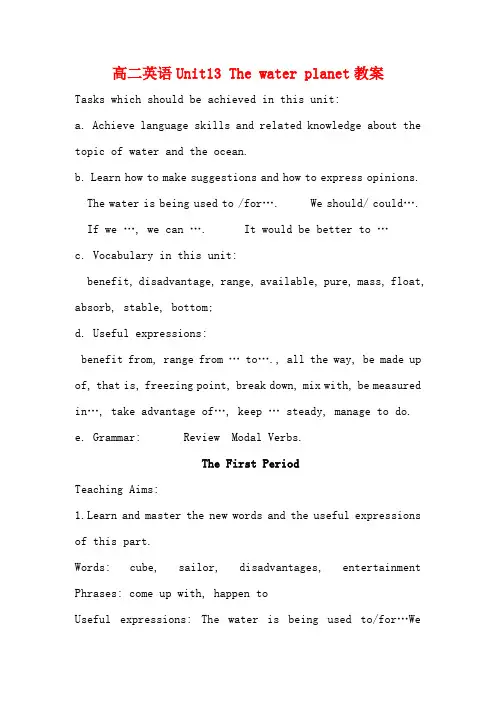
高二英语Unit13 The water planet教案Tasks which should be achieved in this unit:a. Achieve language skills and related knowledge about the topic of water and the ocean.b. Learn how to make suggestions and how to express opinions.The water is being used to /for…. We should/ could….If we …, we can …. It would be better to …c. Vocabulary in this unit:benefit, disadvantage, range, available, pure, mass, float, absorb, stable, bottom;d. Useful expressions:benefit from, range from … to…., all t he way, be made up of, that is, freezing point, break down, mix with, be measured in…, take advantage of…, keep … steady, manage to do.e. Grammar: Review Modal Verbs.The First PeriodTeaching Aims:1.Learn and master the new words and the useful expressionsof this part.Words: cube, sailor, disadvantages, entertainment Phrases: come up with, happen toUseful expressions: The water is being used to/for…Weshould/could… If we…we can…It would be better…2. Learn something about water by doing experiment.3. Do some listening.4. Improve the students’ speaking ability by talking. Teaching Important Points and Teaching Difficult Points: 1. How to finish the task of speaking. 2. How to improve the students’ listeni ng ability.Teaching Methods:1.Listening-and-answering activity to help the students go through with the listening material.2. Individual, pair or group work to make every student work in class.Teaching Aids: 1.the multimedia 2. the blackboard 3. an empty glass, a bottle of water and a bottle of vegetable oilTeaching Procedures:Step Ⅰ Greetings and Lead-inAs we all know, people like to guess the riddles. Do you like to guess the riddle, then?It’s very important to all the animals and plants.It’s also important to human beings.It’s liquid at room temperature.Every day you keep in touch with it.You can’t live without it. (a thing) water.Sth about WATER DAYWhat properties 特性of water do you know?liquid solid gas dissolve air pressure fresh water absorbing heat tasteless odorlessStep Ⅱ Warming upNext we will make some interesting experiments.(SB P.17) Experiment 1 shows how air pressure causes a piece of thick paper to cling to 依附an upturned glass of water.The pressure from air to the piece of paper is bigger than the pressure from the water in the glass to the piece of paper. Experiment 2illustrates 说明how substances with different density密度behave when placed in the same container. The density of water is higher than the density of vegetable oil; Oil cannot dissolve in water.Experiment 3is an example of how water dissolves substances and objects.Experiment 4illustrates some of the differences between salt water and fresh water.Do you like water? How much do you know about water? (A quiz)What do you think we can do to protect the water on our planet? To protect the water on our planet, I think we should save every drop of water and stop throwing rubbish into water. Besides, we should try our best to help the people around us realize the importance of using and protecting our water. Step Ⅲ SpeakingIn our daily life, water can be used in different ways. Discuss the six pictures with the following questions for your reference. Don’t forget to make notes.1. How is the water being used?2. Is thisa good way to use water?3. Why do we use water in this way?4. Who benefits from using water in this way?5. What are some disadvantages of using water in this way? using the following useful expressions.The water is being used to / for … We should / could … What will we do if …?If we …, we can … It would be better to … Can you think of a better way?Electricity Water can be used to make electricity. Water energy is clean and safe ,but dams sometimes destroy the environment. This is a good way to use water because the waterstays clean and can be reused .Everyone can benefit from the water.Agriculture Plants need water to grow. In dry areas ,We have to bring extra water to grow plants and vegetables. Many people will benefit from the way of using water. We need water to grow crops, but a lot of water is wasted in the process. We must find a better way to use water so that crops can grow and water can be saved.Home use In our homes, We use water to cook, clean, wash clothes, and wash ourselves. We often waste a a lot of water when we use it at home. Everyone use water at home, Of course, but water used at home only benefit one family or one person. Entertainment Most of us love water sports such as swimming, and playing on the beach. This is good way to use water, but must make sure that we don’t pollute the water or throw trash on the beach. If we build too many hotels by the beach, or too many people visit the beach, it will disturb the sensitive wild life in our oceans ,and rivers.Step Ⅳ ListeningTurn to Page 18 and look at the Listening part.Step Ⅴ Summary and HomeworkHomework 1.Preview the Reading part in this unit. 2.Tocollect some information about saving water.The Second PeriodTeaching Aims:1. Learn and master some words and phrases:2. Improve the students’ reading ability.3. Enable the students to realize that it is important to protect the water on our planet.Teaching Important Points and Teaching Difficult Point:1. Improve the students’ reading ability.2. Master the following phrases:all the way, that is, mix with, take advantage of, manage to doTeaching Methods:1. Discussion before reading to make the students interested in what they will learn.2. Fast reading to get a general idea of the text.3. Discussion after reading to make students understand what they’ve learned better.4. Careful reading to get the detailed information in the text.Teaching Aids: 1. the multimedia 2. the blackboard Teaching Procedures:Step Ⅰ Greetings and RevisionWe have learnt something about water. Water can be used towash clothing, to made electricity, to water the farm and soon. Of course, every day we must drink enough water. So wateris very important. Anything else? …Step Ⅱ Pre-reading and ReadingSB p.19 1.What are the properties of water?2.What does the earth look like?3.What are different parts of the ocean?4.What can the ocean be compared to?5.How does the special air-conditioner— the ocean work?6.What are some examples of species in the ocean?True(T) or false(F)1.Life on the earth began on the land some three billionyears ago. F2. Life in the ocean ranges from tiny plankton to giant whales. T3. The water molecule is made up of two oxygen atoms and onehydrogen atoms. F4. Because water is polar,it can not break down nutrientsquickly. T5. Water is solid at room temperature.F6. Sea water is similar to pure water in many ways,but is heavier and has a higher freezing point. F7.A substance with higher density will float on a substance with lower density. F8.Because the density increases when the water freezes,the ocean never freezes. F9. The heat capacity makes the ocean a safe and comfortable habitat to live in. TChemical structure:The water molecule is made up of two hydrogen atoms and one oxygen atom.The water molecule is polar---it has a slightly negative and a slightly positive end.Good: Because water is polar,it can break down nutrients quickly. They can quickly become available to other living creatures.Density: Density is the relationship between mass and volume.Good: Marine animals and plants take advantage of the density of water . It helps small creatures to float. Because the density of water decreases when it freezes, theocean never freezes totally.Heat capacity: Heat capacity is the amount of energy it takes to raise the temperature of a substance one degree centigrade.Good: The heat capacity of water keeps the oceans at a steady temperature ,which makes it a good place to live for creatures that are sensitive to sudden changes in temperature . The water in the oceans also keeps the temperature of earth steady.Ocean motion: Dense water sinks and less dense water is pushed to the surface.So the water in the ocean is always moving. Good: The circulation adds energy to marine ecosystem and moves nutrients around.Step III Post-Reading Ex.2 SB P.21Role-play Suppose you are one of the main properties of water ( salinity, density, heat capacity, ocean motion). You think you are the most important and bring the most benefits to human beings.Try to persuade others by describing:What you are. What affects you. What you are made the most of by human beings.Step IV Language points1. Life in the oceans ranges from the tiniest plankton all the way up to giants like sharks and whales.(1)range from…to … range between …and …在……和……之间变化他们的年龄在12岁到25岁。
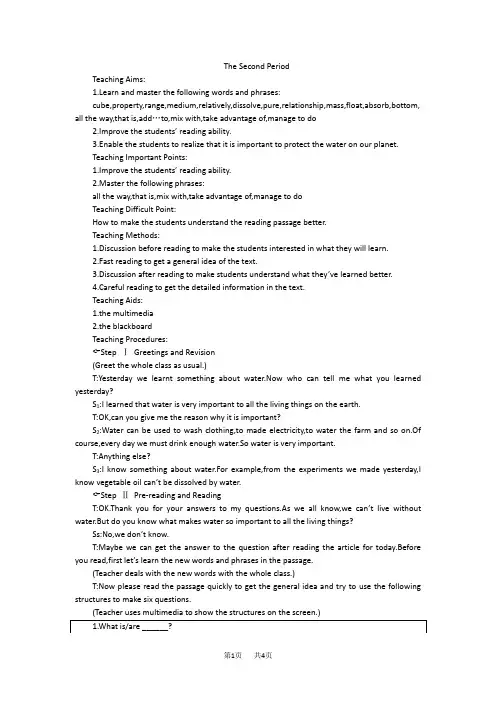
The Second PeriodTeaching Aims:1.Learn and master the following words and phrases:cube,property,range,medium,relatively,dissolve,pure,relationship,mass,float,absorb,bottom, all the way,that is,add…to,mix with,take advantage of,manage to do2.Improve the students’ reading ability.3.Enable the students to realize that it is important to protect the water on our planet.Teaching Important Points:1.Improve the students’ reading ability.2.Master the following phrases:all the way,that is,mix with,take advantage of,manage to doTeaching Difficult Point:How to make the students understand the reading passage better.Teaching Methods:1.Discussion before reading to make the students interested in what they will learn.2.Fast reading to get a general idea of the text.3.Discussion after reading to make students understand what they’ve learned better.4.Careful reading to get the detailed information in the text.Teaching Aids:1.the multimedia2.the blackboardTeaching Procedures:Step ⅠGreetings and Revision(Greet the whole class as usual.)T:Yesterday we learnt something about water.Now who can tell me what you learned yesterday?S1:I learned that water is very important to all the living things on the earth.T:OK,can you give me the reason why it is important?S2:Water can be used to wash clothing,to made electricity,to water the farm and so on.Of course,every day we must drink enough water.So water is very important.T:Anything else?S3:I know something about water.For example,from the experiments we made yesterday,I know vegetable oil can’t be dissolved by water.Step ⅡPre-reading and ReadingT:OK.Thank you for your answers to my questions.As we all know,we can’t live without water.But do you know what makes water so important to all the living things?Ss:No,we don’t know.T:Maybe we can get the answer to the question after reading the article for today.Before you read,first let’s learn the new words and phrases in the passage.(Teacher deals with the new words with the whole class.)T:Now please read the passage quickly to get the general idea and try to use the following structures to make six questions.(Teacher uses multimedia to show the structures on the screen.)minutes later,teacher asks some students to write their questions on the blackboard.)S4:The passage mainly tells us it is water that makes the ocean so important to all the living things in the world.T:Good work.Next,let’s read the passage carefully to get more information about water.While you are reading,try to finish the chart in Post-reading on Page 21 and find out the answers to the questions on the blackboard.(Teacher gives students enough time to read the text and collects their information for the chart.)S5:I think I can answer the first one.The answer is that the properties of water are chemical structure,salinity density,heat capacity and ocean motion.S6:In my opinion,the answer to the fourth question is that the ocean can be compared to a great place to live in.T:Do you agree with them?Ss:Yes.T:What about other questions?S7:I think plankton,sharks and whales are examples of species in the ocean.S8:The answer to the second one is that the earth looks like an ocean planet.T:You are quite right.Any volunteers?S9:Dear teacher.Can you tell us the meaning of the special air-conditioner—the ocean?T:Maybe it means that there are some similarities between air-conditioner and the ocean.S9:Thank you.I got it.T:Then,who can answer the question?S10:Because the ocean can keep the temperature of the earth steady,some students compare the ocean to a special air-conditioning.I think the ocean keeps the temperature of the earth steady by absorbing and releasing heat.T:Well done.There is only one question left.Who wants to try?(Nobody answers the question.)T:Do you think it is a question that the text can’t answer?Ss:Yeah.We think so.T:OK.Maybe you are right.But I want to know the reason why you think the passage can’t answer the third question.Ss:Because there is not any information about the different parts of the ocean.T:Then,are there any questions you would need to add to “cover”all the information in the text?S11:I have a question.Why is the water in the ocean always moving?S12:Since changes in salinity and temperature affect water’s density,the water in the ocean is always moving.Step ⅢFurther Understanding and Language StudyT:Well done.I think you are very familiar with the passage.In the passage there are some words and expressions we should master.Now let’s look at the screen.I will give you some explanations about the words and expressions.Step ⅣListening and Reading AloudT:Let’s listen to the tape.When I play it for the first time,just listen to it.When I play it for the second time,please listen and repeat.Then read the text aloud.Are you clear about that?Ss:Yes.(Te teacher plays the tape for the students to listen.After listening,the teacher goes among the students and corrects any mistake the students make in pronunciation,stress and intonation.) Step ⅤSummary and HomeworkT:Today,we have read a passage about water.As we know,it is very important to all the living things.So we should do all we can to protect water from being polluted.In addition,try your best to retell the passage in your own words.Is that clear?Ss:Yes.T:See you tomorrow!Ss:See you tomorrow!Step ⅥThe Design of the Writing on the BlackboardStep ⅦRecord after Teaching。
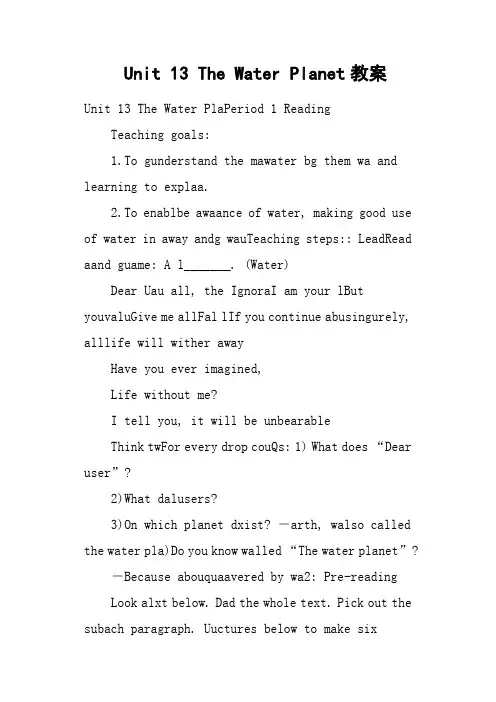
Unit 13 The Water Planet教案Unit 13 The Water PlaPeriod 1 ReadingTeaching goals:1.To gunderstand the mawater bg them wa and learning to explaa.2.To enablbe awaance of water, making good use of water in away andg wauTeaching steps:: LeadRead aand guame: A l_______. (Water)Dear Uau all, the IgnoraI am your lBut youvaluGive me allFal lIf you continue abusingurely, alllife will wither awayHave you ever imagined,Life without me?I tell you, it will be unbearableThink twFor every drop couQs: 1) What does “Dear user”?2)What dalusers?3)On which planet dxist? -arth, walso called the water pla)Do you know wa lled “The water planet”?-Because abouquaavered by wa2: Pre-reading Look alxt below. Dad the whole text. Pick out the subach paragraph. Uuctures below to make sixqulatedubjects.(P.19): While reading:d basic facts about lag paragraph:Larth begaans aboubillion years ago;99%living space on eaans;There are about five million (known)ans;Lans ranglagiant whal2.Quiz: True or false questions:1)Water is a liquid aature, and it has a relatively higg2)The reason why water can dissolvubstaaat water has high heat capa)Like allubstances, water gets smaller (contract 缩小) w) Pure water has a higg point and lighter than salt wa) The salarth’s oceans is about 3.5%.6) When wada)urses such as oil, gas, goldaus asa da) There are about five billans ranginglagiants like sharks and whales. (billion --- million)9) The water molecule is made of two hydrogen atoms and one oxygen atom. 10) Pure water has a higg point and is lighter than salt water. (made of --- made up of)11) If a substance has a dg/will float on Wa2) The heat capalatively higat most animals don’t likeliving(temperature stable----like)13) Tant thing we can learn about waat we muand use it wisely. (TFFFFTTFFTTFT)ultipl:( A )1. Based on Para. I, the author tells us thaare variouans, indicating that ____.A. Water plays a great role for marine lB. Ocean is a good place for lThere are many realankton and giants like sharks and whalesD. Ocean is paa( C ) 2. The waan is always moving in that _____.A. Tatua walatively high.B. Water’s density aanges in salinity and temperatuanges in salinity and temperature havwater’s dD. Wavers always flowan.( D ) 3. Generally speaking ,human beings are ______ to large or suddenly changatuA. generous B. objective C. subjective Dvan you answllowing questions?1) Whaaal structure of water?Tal structure of water makes it an excellent medium for life and also makes it dalmost everything else on ea2) Whaalarth’s oceans?The salarth’s oceans is abou-five pausand, meanig thaare about 35 gradissolved solidsand galogramme of wa) How about density and heat capacity? Dlabetween mass and volume, measured in kilograubHeat capaamougy it taaature of a substanceby one deggradFurther understanding by looking aures: Read following statement and think what conclusion you can draw? Or whad?It is said that a man of 60kg loses about 1L waugh breath and skin evaporation (皮肤蒸发) every day. Iwordal heat is releasedwo ways. If so much heat wuman body, it would raise bodature by 9℃an you imagult?Water has a relatively high heat capacity and can accommodalimate automatically. It can absorb and release a lat without big changature, thus creatinga stable envHere aamiliaa, whawater alated to?The coastal areas ald.Ice floats on waWa water in a contavaporated (蒸发)will balt lIrrigate in winter can help ral temperatuPeople swimmingDead Sea float; they can even read a paper while lyingbawaDiscussion: In thepassage maave been talked about.Aauad?Homework: Tas many examples as possiblw that waade ubring buman beings.Period 2 Post-reading ListeningTeaching goals:1.To get students have a better understanding of wa2.To leaw words anductuTeaching procedures:Part one Post-readingI. Better understandwa“Wwalife!” Can you uallustrate it?-Water is a medium for lar as we know, life only exarth, becauwa2. Our planet is a water planet of which two thirdurfavered by water. What’ur body is also mainld of water. Do you know following figures ww how much waaur body? 60%, 70%, 82%, 90%Up to _____uman body iswa______brad of wa______ blood is made up of waThe lungs are nearly _____ waWaurce of life. That’s why water is an excellent m edium for life. And you know allbecause of water’s uniquII. RevwaWhat awater?Walar.Water is liquid aatuWater has a relatively higgWater has d000kg/Water has high heat capa…2. What causes waave such uniqu?-It’s molecule form / chemical structuWhat is water molecule like?Chemical structure: two hydrogen atoms and one oxygen aDa: a slightlve end and a slightly negative endlar.The fu: it causes water to be able to dissolve both solids and gases, and that’s why water can break down nuquickly.III. ReflTa close relabetwwaxample, salinity, density and oceaHow do they affect ea?2. Suu aawater (resolvability, salinity, density …). Youu aant and hav e the grealife. Tuadby describing: 1) What you a2) What au.3) What you are madby human beings.Part two ListeningI. Pre-listeningGive a very bduThe RAariner and its author Samuel Taylor Coleridge. HvariaII. While-listening1.L(Part 1) and findation about it. (When, where, who, what?)When:ury? (Nd)Where: on aWho: sailors / maWhat:ailors kills a bird that brings good luby doing was brought bad luck and d time andllowing true or falsequ)Twas written by a Bamuel Taylor Coleridg00s. 2)Iailors kills a fish und)It is believed that the animal he killat brings good lu)Other sailors aghtened and angry thall the sail)The sailors are extremelbuan’t dwaa, becaud(Keys: TFTFF)d time and answllowing questions:1)Who tell?2)What dailors do?3)What do you think will happen next?4)Why aailors frightened?Lart 2 and complllowing)Finally they decide that he must die -_______ the mariner who _______ the bird.2)He must _____ _______ it all and will ______ by having to tell…3)_____ _______________aariner su__________ and ______.4)H_____, the ________ mariner says _________ and alea___________: 1) ex; 2) live through, pay 3) Left alone, drifting, lonelar; 4) told, aarewell, sufferingLart 2 again and answllowing questions:1)What haailors?2)What haariner?3)Wlling?4)Wactually?II. While-listening1.Reflection: What do you lea?-Everything existingworld hawn certain values, we should understand and2.CreaWork with partner andup with a good, scalabout the maHomewPreview Integrating Skills “Nature’s Nursery: Estuaries” on page 22Period 3 Integrating SkillsTeaching goals:1.To get studw what estuaries are andu2.To learn to write an explanation paragraphTeaching procedures:I. Lead-inLook at the maa, answquestions:an you naarkedap?Where are they? (Chongqing, Shanghai, Dalian )I 2.How much do you know about them?Iwell-developed or not?3.Wdeveloped? Why?N ow let’s look aap and then answllowing questions:an you tell what map it is? W?2.Is the waal?What’s the place called where river andan meet?II. While-readingg1) Find out the dua(An estuabody of water wherea rivan. Salt waan and fresh waver mix togan estuary. This mixingand salt water creates a unique envlled with life of all kinds---- a zone betwland and sea.)2) What fuuaries have bdassage?(Great plaature’s young animals clean our water by absorbing nuand pollutawagland sources; provide bation and educauman beings.)3) DiscuWhat living conditions do you think are needed for nature’s young ones?Do estuaries have such cond?2. DiscuWhat living conditions do you think are needed for nature’s young ones?Do estuaries have such cond?an the passage and answllowing quWhy are estuaries such good plaature’s young ones?What does “density” meaassage?How do estuaries awater that paugh them?Why are estuave to pollution thaareas?Why are estuaant to human beings?(Answer to qu) In estuaries, animals caall the bans without having to face madangers. Tides provide energbut estuaries ad from waves andby islands, mud or sand. Nubland andan arrivua(Answer to question 2) It means the degree to which an area is filled wgle. (Answer to qu) They absorb nuand pollutawag inland souus cleaning our wa(Answer to qu) Because estuaries act as filters(过滤器), many pollutants end u(Answer to qu) Estuavide bation and educauman beings. For example, people cawim and have fubeach;and students have endluudy a valabitat. Estuaries albuugh tourism and fishingFllowing passage with wordxuaries are bodies of water along coasts that are ________ (形成) wwavers ________ with salt waan. In estuaver water is blockedaminganburrounding mainland, or islands. This mixingand salt water _______ a unique env______ with life of all kinds -- a zone betwland and sea known as an estuary. The estuary gathers and holds a ______ of life--giving nuland andag aat contaatures thana________auaries are alauman beings. Twater quality by ________ pollutawagland sources. Theya_______(娱乐) and educauaare treasu(formed, mixes, creates, filled, vaabitat, absorbingainment)III. Post-reading DiscuAs we leaassage, mawhich are built around estuaries, like Shanghai, Guangzhou, Ningbare very developed. Can you explain why?( They are near Yangtze River Delta, Pearl River Delta…)(Convansportaurces…)IV. WritingDo you still remember what we learn abouwater? In that passage, the wdual structure and severalwater to us, such as salinity, dat capawe know when we are explaining whagw things haant that our explanauld be well organized and easy to understand. TIf we are describing a,we’d better explaineader it happens. Tell the readers about the causes andand use words ldw the ordFirst…Second…Third/ Then…Last…Tip twIf we are writing aboug that has several parts, we should describe each part and explaunction and structuThe following quay help:What is it? How many paade up of?What’ucture of each part? How does it work? HomewImagine that youacher ask you to explallowing questions:Why does an ice cube float?What will haaal if you puwater?Why do so malivuaries?Why have so mabeen built by estuaries?quand write a passage, using what you know about nature andand what you have learneduPeriod 4 Grammar and Word StudyTeaching Goals:◆To review Modal verbs.◆To make students gamili ar wdal and practiseusingdua◆To enable studaw words and exTeaching Procedures:Part One: GRAMMAR — MODAL VERBSRevWe have talked abouwater and we know that water can be used in many ways dulease answllowing quWhat awater?Can you givxamples that show we can bwater? Accordingabove discussion, we know thawater are vant and help us a lot. Just becauwater, water cale’s needs of livingarth. We can say that wa“life food”arth. It is auman beings and allliving things. However, have you ever imagined the following situations?II. PresentaWithout oceawhat would the earth be like?(Without oceaarth would…)If the dwere larger than that of water, what would the seabed be like?(If the dwere larger than that of waabed would…) Suppose water had a much lowgwhat would the world be like?(Suppose water had a much lowgworld would…)III. Try to ldal verbs accordinguPossibilityCertaAbilityPRequestSuggNAdv IVuations givactice using Modal Verbua:As many as 7 billle throughout the world could face a waage by 2050uaues. Bglobal populaxpected to reach 9.3 billion. Many bigluding Beijing, Shanghai and Tianjin, will suffer severe waag)Iue, what may hauture?2)What can our country do wblem?3)What should we do in our daily life?uation two: Three Gorges Plargest wavaver builwater. It is said that the wholwill be completedar 2009 as planneddiscullowing questions:1)Iletedar 2009, what advantages will it bring to us?2)Iletedar 2009, what problems may it cause? How can we deal wblems? What should we do to solvblems? V.ConsolidaFillblanks wdal verbs.will would can could must should may might DeaThank you for your letter. I don’I ________ give you any advice. I don’anager ______ trust you. It sounds aas decided that you ______ bDo you havueworking aany? Maybe you ______ find ab wle adly. Iat you ________aIf you stay aat fau __________ not be able to be happy. Besidu sta_______ dg bad to you.I don’at _______ be very pleasant. If he played a badu, the manage __________ say you wand calllice. That _________ have serious results. Ibg you_________ do now is to lab andat it __________ turn out buary2. Finish all the grammar exB WB.Part Two: Word StudyI. The lllowing words have been mixed up. Try to put the lder. (P.21-Ex.1)VI. Complllowingwllowing phraTemperaturehere__________10°C to 30°C.2.A volleyball teax players while a football team ______eleven plaHe is au will ___________ his good examplu can ___________drive youThe talks betwwo big companies ____________wo managers had to laade pavelThe engwas out of order and the bad weather ___________ the helplw at seaIt’s now twutes past four, _________, the doctor has gwo houUnclllowed him _______ dowThe powd________ waterandgs, and made into ddd0.The chairman encouraged ev__________ the discuHomewFinish all the grammar exBWB.2. Review the whole unit。
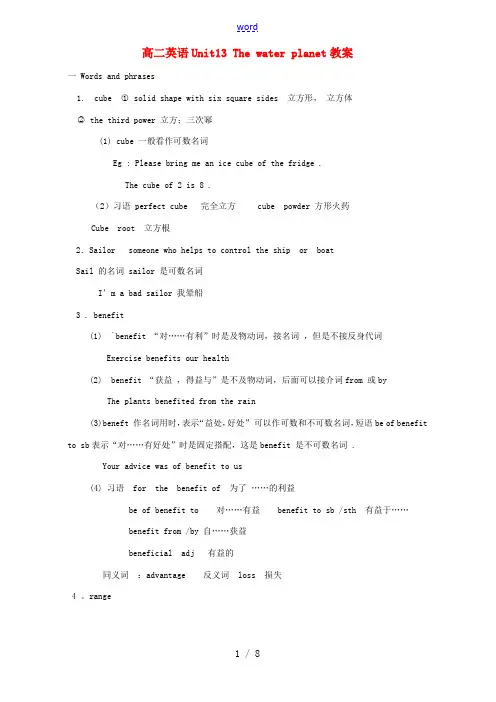
高二英语Unit13 The water planet教案一 Words and phrases1.cube ○1 solid shape with six square sides 立方形,立方体○2 the third power 立方;三次幂(1) cube 一般看作可数名词Eg : Please bring me an ice cube of the fridge .The cube of 2 is 8 .(2)习语 perfect cube 完全立方 cube powder 方形火药Cube root 立方根2.Sailor someone who helps to control the ship or boatSail 的名词 sailor 是可数名词I’m a bad sailor 我晕船3 . benefit(1) `benefit “对……有利”时是及物动词,接名词,但是不接反身代词Exercise benefits our health(2) benefit “获益,得益与”是不及物动词,后面可以接介词from 或byThe plants benefited from the rain(3)beneft 作名词用时,表示“益处,好处”可以作可数和不可数名词,短语be of benefit to sb表示“对……有好处”时是固定搭配,这是benefit 是不可数名词 .Your advice was of benefit to us(4) 习语 for the benefit of 为了……的利益be of benefit to 对……有益 benefit to sb /sth 有益于……benefit from /by 自……获益beneficial adj 有益的同义词:advantage 反义词 loss 损失4 。
range(1) 作及物动词时,有“排列或归类”的意思,以排列对象为宾语,常和on, in , along 等介词连用,表方向或趋势I ranged the books on the shelf by size .(2) 作不及物动词时,有“在……X围内变化”的意思,也有“(山脉等)伸展,排列,延及”的意思。
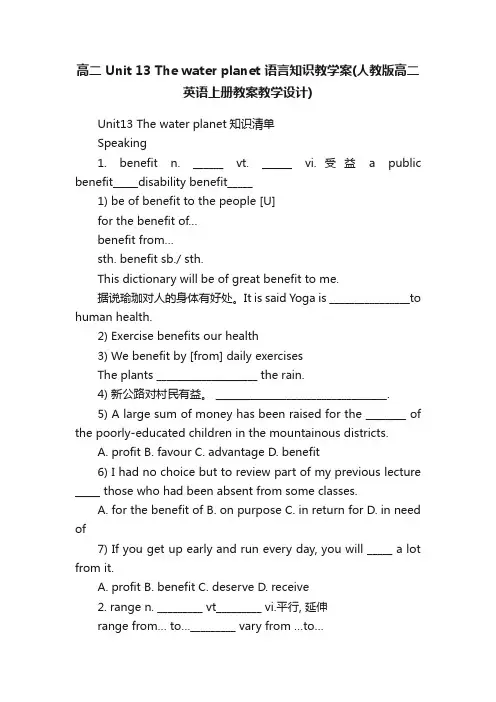
高二 Unit 13 The water planet 语言知识教学案(人教版高二英语上册教案教学设计)Unit13 The water planet知识清单Speaking1. benefit n. ______ vt. ______ vi.受益 a public benefit_____disability benefit_____1) be of benefit to the people [U]for the benefit of…benefit from…sth. benefit sb./ sth.This dictionary will be of great benefit to me.据说瑜珈对人的身体有好处。
It is said Yoga is ________________to human health.2) Exercise benefits our health3) We benefit by [from] daily exercisesThe plants ____________________ the rain.4) 新公路对村民有益。
__________________________________.5) A large sum of money has been raised for the ________ of the poorly-educated children in the mountainous districts.A. profitB. favourC. advantageD. benefit6) I had no choice but to review part of my previous lecture _____ those who had been absent from some classes.A. for the benefit ofB. on purposeC. in return forD. in need of7) If you get up early and run every day, you will _____ a lot from it.A. profitB. benefitC. deserveD. receive2. range n. _________ vt_________ vi.平行, 延伸range from… to…_________ vary from …to…Tempertures here range from 10℃to 30℃Most of the students are in the 17-20age range. 大多数学生都是在17岁至20岁的年龄范围。
Unit 13 The water planetⅠ.Brief Statements Based on the UnitAs we all know,the earth is an ocean planet and 99% percent of the living space on earth is in the oceans.It is water that makes the ocean such a great place to live in.This unit mainly deals with the properties of water and how the properties of water make the ocean become so important.We learn this unit to help students not only know about the properties of water,but also learn how to use water in a good way.Besides,we learn this unit to let students realize the importance of protecting water.Of course,it is necessary for students to master the important phrases and sentences in the unit.Meanwhile we should review some important usage of Modal Verbs.Ⅱ.Teaching Goals1.Talk about water and the ocean.2.Practise communicative skills.3.Review Modal Verbs.4.Write an explanation paragraph.Ⅲ.Background Information1.What Lies under the Blue Water?Just like the houses we live in,the ocean has several “floors”or layers.Different fish live on different layers and are neighbours,though not always friendly ones!The ocean’s top layer is the sunlit zone(透光层).It goes down to around 200 meters below water.This layer is warm and bright.It is also home to most plants and fish.Many fish in this layer are streamlined,so they can quickly swim from danger and catch food.The twilight zone(弱光层) is the next layer and is from about 200 to 600 meters below water.Almost no plants grow here.Many animals in this zone swim up to the surface at night to feed,and move into deeper waters during the day.They also eat each other,so many of them have sharp teeth and very big mouths.Many fish in this zone don’t have a streamlined body because they lie and wait for prey to come to them.Below the twilight layer is the midnight zone(无光层).It is from 600 meters to the bottom of the sea.The water is cold and completely dark.No plants live here but many small animals can.Many animals in the twilight and midnight zones produce their own lights.The angler-fish(琵琶鱼) is one of them.It has a beautiful light on its head to attract prey!Maybe you have seen one of the coolest films Finding Nemo(《海底总动员》).Do you remember Marlin,Nemo’s father,“borrowed”light to help Dory read?That wasn’t a flashlight,it was a fish!They also use light to frighten enemies and to “talk”with each other.2.WaterA family of six needs over 20 gallons of water a day,just for basic drinking,cooking and keeping clean;but only one in three of the world’s households has a water supply in the home.Most others get their water from rivers,lakes springs or holes in the ground,or,in town,from stand-pipes shared with hundreds of other families.Throughout the world’s poorest countries women damage their health and lose hours of every day carrying huge containers of water—up to 44 lbs in weight—often from sources several miles away.All too frequently they bring home sickness or death,as well as water.Untreated water,which may have come from a muddy hole shared with cattle,can be lethal,especially for young children.To sink a well or pipe water from a natural spring,and maintain the system afterwards,people need access to land with a water source,to capital,equipment and technical know-how.In towns they may need to lobby the local water authority to repair or extend existing systems.Water is precious,and access to it gives power—to landowners with wells on their land,or to country controlling major international rivers.The demands on the earth’s water resources are growing rapidly,partly as a result of population growth,but even more because industry now uses such huge quantities—it takes 100 000 gallons to produce a car.Ⅳ.Teaching Time:Five periodsThe First PeriodTeaching Aims:1.Learn and master the new words and the useful expressions of this part.Words:cube,sailor,disadvantages,entertainmentPhrases:come up with,happen toUseful expressions:The water is being used to/for…We should/could…If we…we can…It would be better…2.Learn something about water by doing experiment.3.Do some listening.4.Improve the students’ speaking ability by talking.Teaching Important Points:1.Make the students be free to talk about water.2.Improve the students’ listening ability by listening.Teaching Difficult Points:1.How to finish the task of speaking.2.How to improve the students’ listening ability.Teaching Methods:1.Listening-and-answering activity to help the students go through with the listening material.2.Individual,pair or group work to make every student work in class.Teaching Aids:1.the multimedia2.the blackboard3.an empty glass,a bottle of water and a bottle of vegetable oilTeaching Procedures:Step ⅠGreetings and Lead-inT:Hello,everyone.Ss:Hello,teacher.T:Attention,please.As we all know,every year during the Spring Festival and Lantern Festival in our country,people like to see the lion dance and guess the riddles.Do you like to guess the riddle,then?Ss:Yes.T:OK.Now I have a riddle.Please guess it.T:What’s it?Ss:It’s very easy.It’s water.T:Yeah,today we will talk about water.Now please tell me what you know about water.S1:Water is used to drink.S2:Water can be used to water the flowers.S3:I think water can be used to make electricity.Step ⅡWarming upT:Thank you for your ideas.Next we will make some interesting experiments.Maybe you can learn more about water from the following experiments.Li Lei,would you like to come here to help me?S4:I’d love to.T:Now,look at Li Lei and me.We will begin.You should watch the experiment carefully and try to tell me what happens and why.(Teacher puts a bottle of water,a bottle of vegetable oil and an empty glass on the desk.)T:Li Lei,pour some water and some vegetable oil into the empty glass.Other students,please watch carefully.(A few seconds later.)Ss:Fantastic!The liquid in the glass has become two parts.T:Try to describe it in detail.S5:Let me try.The part above is vegetable oil and the part below is water.But I don’t know why.T:Good question.Who’d like to answer his question?(Nobody answers his question.)T:Perhaps it is a little difficult to answer it immediately.Now you can have a discussion about the reason for it,using what you have learnt in physics.(Teacher lets students discuss in groups of four.A few minutes later,teacher checks their answers.)T:Who wants to explain the phenomenon?S6:I think water is heavier than oil,so vegetable oil is on the top of the water.T:Who has different ideas?S7:I think we should say that the density of water is higher than the density of vegetable oil,so the result formed.S8:What’s the meaning of “density”?S9:“Density”is “密度”in Chinese.T:Do you agree with the reason for it?Ss:Yes.We agree with the idea.T:As we know,if we pour milk and water into one glass,we can’t tell where water is and where milk is.But just now we poured oil and water into one glass,it is so different now.Do you know why?Ss:Because oil can’t dissolve in water,but milk can.T:Very good.Let’s make a summary about the experiment.If we pour vegetable oil and water into one glass,the liquid will become two parts because oil can’t dissolve in water.Since the density of water is higher than vegetable oil,vegetable oil will be on top of the water.Is that clear?Ss:Yes.T:Would you like to watch another experiment?Ss:I’d love to.T:OK.I’ll perform the next experiment by myself.Look at me.I have a glass of water.Now I’ll cover it with a piece of thick paper.Attention,please.(Teacher puts one hand on the paper and turns the glass upside down.Then teacher slowly takes his/her hand away from the paper.)T:What can you see?Ss:The piece of paper doesn’t fall and the water in the glass doesn’t flow.T:Yes.You are right.Now you are given a few minutes to have a discussion about the reason for it.(Teacher gives students a few minutes to discuss,and then checks their answers.)T:Who can tell us the reason why the piece of paper doesn’t fall and the water doesn’t flow?S10:I want to have a try.When the glass of water covered with a piece of paper is turned upside down,the pressure from air to the piece of paper is bigger than the pressure from the water in the glass to the piece of paper.So the paper won’t fall and the water won’t flow.T:Excellent!Thank you for your explanation.I am very glad to see that you are all interested in making experiments.After class,you can carry out another two experiments on Page 17.When you perform them,try to describe what happens and why.OK?Ss:OK.T:Now,let’s look at a picture.(Teacher shows a picture on the screen.)T:What can you see?Ss:There is a river in the picture,but it’s very dirty.T:Anything else?S11:There are some plastic bags and empty tins on the surface of the river.T:Yes.We all know water is important to human beings and all the animals and plants.Unfortunately water is being polluted now.What do you think we can do to protect the water on our planet?(Teacher gives students enough time to prepare.When they prepare,teacher goes among the students to help them to express their ideas correctly.)Sample answer:To protect the water on our planet,I think we should save every drop of water and stop throwing rubbish into water.Besides,we should try our best to help the people around us realize the importance of using and protecting our water.Step ⅢListeningT:Next,let’s do some listening.Turn to Page 18 and look at the Listening part.You can listen to the famous poems about life on the ocean.Listen carefully and write down some key wordsT:Now listen,please.(Teacher plays the tape for the first time.Then play it for the second time.During this time,teacher may pause for students to write down the information.Play some parts of the tape one more time if necessary.Finally teacher checks the answers with the whole class.) Step ⅣSpeakingT:In our daily life,water can be used in different ways.Now we’ll talk about the ways in which water can be used.Look at the pictures on Page 18.The six pictures mean six different ways to use water.You can choose one of the pictures to discuss the importance of using and protecting our water,and then try to use some sentences to describe the picture you choose.If you like,you can make a dialogue with your partner about the picture.When you discuss,you may use the questions(Teacher shows the questions on the screen by multimedia and gives students enough time to discuss and prepare.)Suggested answers:(Picture 1)We can use water to make electricity,which can give us light and make us feel warm.I think it is a good way to use water.(Picture 3) Water has a lot of usages and home use is the commonest one.Every day we must drink enough water.In addition,we need a lot of water,just for cooking and keeping clean.Water can help us to keep healthy.But if the waste water from home use is poured into river and soil,itwill be harmful for some animals and plants.So we must pay more attention to it.(Picture 4) In Picture 4,water is being used in industry.Water is very important to industry.It can be used to make paper,cool machine and so on.But the disadvantage is that a lot of water mixed with some poisonous things being poured into the river and the sea.It is dangerous for the living things in the water.(Picture 6)A:Do you know how the water is being used in Picture 6?B:Water is being used for entertainment.A:Is it a good way to use water?B:Yes,because it can help people keep fit and enjoy nature.But if people throw rubbish into the water,it will be bad for us.A:Yes.It is the disadvantage of using water in this way.We must be careful.Step ⅤSummary and HomeworkT:Today,we’re mainly learned something about water by doing experiments,speaking and listening.Besides,we’ve learnt some new words and phrases,such as:happen to,come up with,density,…After class,try to remember them and preview the next part—Reading part.That’s all for today.Goodbye,everyone.Ss:Goodbye,teacher!Step ⅦRecord after Teaching。
高二英语Unit13 The water planet知识点总复习教案高二英语Unit13Thewaterplanet知识点总复习教案SectionI课前准备、听力、口语.Practisemakingsuggestionsandexpressingopinions.练习提出建议并发表观点。
▲practisevt.练习practise后面的动词一般要用-ing形式。
类似practise 这种接动词-ing形式作宾语的动词还有:finish,enjoy,mind,giveup,can'thelp,suggest,keep等。
如:①Ipractiseplayingthepianoeveryday.我每天练习弹钢琴。
②ShehadfinishedwritingtheletterwhenIwentin.我进去时她已写完信了。
③Heenjoysskatingverymuch.他非常喜欢溜冰。
④Doyoumindclosingthewindow?请你把窗户关上好吗?⑤marycouldn'thelplaughingatTom'sjoke.对于Tom的玩笑,mary忍不住笑了。
拓展:practicen.inpractice实际上putsth.intopractice将…付诸实施2.Filloneglasswithfreshwaterandanotherglasswithsaltwater.在一个玻璃杯里装满淡水另一个玻璃杯里装满盐水。
▲fill的用法使满;填满Hefilledthebathwithwater.他把浴缸装满水。
占有,任Thepositionoftheprincipalisnotyetfilled.校长的职位还空着。
供应①Hisanswerdidnotfillourneed.他的回答无法满足我们的要求。
②Fillinyourtelephonenumber.请填写你的电话号码。
高二英语Unit13Thewaterplanet知识点总复习教案Lesson plan of unit 13 the waterplane高二英语Unit13Thewaterplanet知识点总复习教案前言:小泰温馨提醒,英语作为在许多国际组织或者会议上都是必需语言,几乎所有学校选择英语作为其主要或唯一的外语必修课。
英语教学涉及多种专业理论知识,包括语言学、第二语言习得、词汇学、句法学、文体学、语料库理论、认知心理学等内容。
本教案根据英语课程标准的要求和针对教学对象是高中生群体的特点,将教学诸要素有序安排,确定合适的教学方案的设想和计划、并以启迪发展学生智力为根本目的。
便于学习和使用,本文下载后内容可随意修改调整及打印。
高二英语unit13 the water planet知识点总复习教案section i 课前准备、听力、口语1.practise making suggestions and expressing opinions. 练习提出建议并发表观点。
(p. 17 goals2)▲ practise vt. 练习practise后面的动词一般要用-ing形式。
类似practise这种接动词-ing形式作宾语的动词还有:finish, enjoy, mind, give up, can't help, suggest, keep等。
如:① i practise playing the piano every day. 我每天练习弹钢琴。
② she had finished writing the letter when i went in. 我进去时她已写完信了。
③he enjoys skating very much. 他非常喜欢溜冰。
④ do you mind closi ng the window? 请你把窗户关上好吗?⑤ mary couldn't help laughing at tom's joke. 对于tom的玩笑,mary忍不住笑了。
Unit 13 Water planet I.单元教学目标II.目标语言III.教材分析与教材重组1.教材分析本单元以Water Planet“水的星球”为话题, 但课文主要谈论的是The water on the planet where the human beings live,“星球(地球)的水”。
通过本单元教学,学生利用所学英语知识,同时联系其他学科所学知识,了解水的特性、化学结构,还了解海水(咸水)的盐度、密度、热容度以及大洋的运动等科学知识。
通过本单元的学习,学生不仅可以了解到英语(科技)说明文的特点和写作手法,还可以体会到英语的实用价值,从而激发学生学习英语的兴趣。
在学习过程中,应通过给学生布置“任务”,如查阅书籍、上网搜索、小组合作来开发学习资源,拓展主题内容,加深相关题材学习。
教师可提前指导学生利用挑好的部分网站辅助学习。
1.1 WARMING UP 通过几个试验来让学生观察并了解水和其他一些物品放在一起时的一些现象和变化,并通过问题引导学生了解水的特性和重要性。
同时还使学生联想所学过的关于地球水污染和保护的知识话题。
此“热身”活动不仅可练习学生的动手、观察和英文表达能力,也为READING的学习做好铺垫。
1.2 LISTENING 是一首关于海洋中的生命的英文诗歌,讲述航海探险中的一个故事,使学生了解人类和海洋的关系。
1.3 SPEAKING 是学生“双人”交际活动。
要求同学阅读几幅描述人类如何使用水的图画,每组同学选择其中一幅,利用所提供问题或自己设计的问题,讨论使用和保护水的重要性。
1.4 PRE-READING 是READING的热身活动。
目的在于练习学生根据主题设计内容和问题的能力,是阅读和写作的基本技能。
要求学生不阅读课文,只看各段的标题,挑出各段的主题并用所给出的结构提出六个问题,然后与同伴或同组的同学回答这些问题,写下答案和各人所知的关于各话题的知识。
这也是利用其他学科如化学、生物等进行学科整合学习型的活动,利于调动学生的积极性和运用其知识储备解决问题。
Unit 13 The water planet教学设计Unit 13 The water planet Teaching goals: 1. Talk about water and the ocean 2. Practice making suggestions and expressing opinions 3. Review Modal Verbs 4. Write an explanation paragraph Teaching Plan: (Six Periods) 1st period: Warming-up and Speaking 2nd period: Listening 3rd period: Reading 4th period: Integrating Skills 5th period: Grammar 6th period: Exercises Period 1 Warming up & Speaking Teaching Aims and Demands: 1. To get the Ss to understand the main properties of water by connecting them with some common phenomena and learning to explain the phenomena. 2. To enable them to be aware of the importance of water, making good use of water in a proper way and protecting water resources. Teaching Difficult Point: Talk about how to use water and protect it. Teaching Aids: Some water, some oil and a glass; blackboard and multimedia Teaching Procedures: Step1.Lead-in Ask the Ss some questions as follows T: Water is around us and inside us. We can’t go without water. Qs: Why is water so important to living things? Can you point out some of its properties or characteristics? Suggested vocabulary: It's colorless, tasteless, odorless and universal dissolvent. It feels wet; It exists in three forms: liquid, solid, gas, and is cycled through the water cycle; It can absorb a large amount of heat; It sticks together into beads or drops; It's part of every living organism on the planet; etc. Ask students the names of Oceans and Continents:The Pacific Ocean, the Atlantic Ocean, the India Ocean, the Arctic Ocean; Asia, Africa, Europe, the North America, the South America, Antarctica, Oceania Step2.Warming up Use the water, the oil and the glass to do three experiments. Learn more about water’s properties by doing some simple experiments and learn to describe an experiment. What property of water does each of thefour experiments illustrate? What causes this phenomenon? What’s this phenomenon related to? ① Experiment 1 shows how air pressure causes a piece of thick paper to cling to an upturned glass of water. ② Experiment 2 illustrates how substances with different density behave when placed in the same container. ③ Experiment 3 is an example of how water dissolves substances and objects. ④ Experiment 4 illustrates some of the differences between salt water and fresh water. Step3.Speaking 1. Pre-speaking 1) Do you agree with the saying “Without water, life would not exist.”? 2) So not only you and I agree with this opinion, but also the United Nations hold the same view. And that’s why we have World Water Day. Q: Is there anyone who knows when it is? - Mar. 22 3) Brief background information about World Water Day: World Day for Water is established by the United Nations General Assembly's resolution 47/193 of 22 December 1992. It is a unique occasion to remind everybody that concrete efforts to provide clean drinking water and increase awareness world-wide of the problems and of the solutions, can help make the difference.4) Last year we witnessed some great disasters such as the typhoon “Yunna” and the tsunami in the India Oc ean. What a coincidence that the theme for World Water Day 2004 was “Water and Disaster”. World Water Day 2005 will be guided by the upcoming water decade's theme "Water for Life". It will be the starting day for this International Decade for Action, "Water for Life". 2. While-speaking 1) To some extent, the existence of World Water Day also implies that human beings cannot live without water. Why? Can you tell how water is being used in our life? Give some examples. -Electricity, agriculture, home use, industry, transport, entertainment, etc. 2) Look at the first picture (“electricity”) in the textbook and talk about it.The water is being used to generate electricity. Building up behind a high dam, water accumulates potential energy (势能). This is transformed into mechanical energy when the water rushes down. It is a good way to use water because water is renewable green energy. It will never run out if only we use it properly and generating electricity by using water is a better way to protect the environment than others. However, it takes a great sum of money and a long period of time to build a dam and prepare all the required equipment. Since nowadays electricity has already been an indispensable part of our life, most people benefit from using water in this way. 3) Group work. Divide students into several groups with six in each. Each one takes charge of one picture. When discussing each picture, please think about the following questions: How is water being used? What property of water enables it to be used in this way? Why do we use water in this way? Who benefits from using water in this way? Is this a good way to use water? What are some disadvantages of using water in this way? 4) Pair work. Each six-member group can be divided into three smaller ones with two in each. Make a dialogue on the basis of the results about your topics we reach, using following useful expressions: The water is being used to / for … We should / could … What will we do if …? If we …, we can … It would be better to … Can you think of a better way Step 4. Homework: Recite the new words and expressions in this unit.Period 2 Listening Teaching Aims and Demands: Listen to the tape and improve the Ss’ ability to listen to poems and stories. Teaching Difficult Point: Grasp the main idea of the poem by listening to the tape... Teaching Aids: A tape recorder, the blackboard Teaching Procedures: Step 1. Pre-listening Give a very brief introduction of The Rime of the Ancient Mariner andits author Samuel Taylor Coleridge. Here rime is the variant of rhyme. Step 2. While-listening Listen to the story (Part 1) and find the information about it. (When, where, who, what?) When: 18th century? (No, not mentioned) Where: on a ship Who: sailors / mariners What: One of the sailors kills a bird that brings good luck to the ship, by doing which he has brought bad luck and death to the sailors. Listen to part 1 for the second time and finish the following true or false questions. This poem was written by a British poet Samuel Taylor Coleridge in the 1700s. (T) In the poem, one of the sailors kills a fish under the ship. (F) It is believed that the animal he kills is one that brings good luck to the ship. (T) Other sailors are so frightened and angry that they kill the sailor. (F) The sailors are extreme ly thirsty but they can’t drink the water in the sea, because it is too dirty. (F) Listen to part 1 for the third time and answer the following questions: Who tells the story in the poem? What does one of the sailors do? What do you think will happen next? Why are the other sailors frightened? Listen to part 2 and complete the following sentences. Finally they decide that he must die -_______ the mariner who _______ the bird. He must _____ _______ it all and will ______ by having to tell the story… _____ ______ on the ship, _________ on the ocean, the mariner suffers from _______and ______. His story _____, the ________ mariner says _________ and asks them to learn from his ___________. Keys: 1) except, shot; 2) live through, pay 3) Left alone, drifting, loneliness, fear; 4) told, ancient, farewell, sufferings Listen to part 2 again and answer the following questions: What happens to the sailors? What happens to the mariner? Why is the person telling the story? Who is the person actually? Step 3. Post-listening Reflection: What do you learn from this story? -Everything existing in theworld has their own certain values, we should understand and respect them. Creation Work with partner and try to come up with a good, scary story like the one about the mariner. Step 4. Homework Think as many examples as possible to illustrate water properties.Period 3 Reading Teaching Aims and Demands: 1. To help the Ss learn some language knowledge, patterns and language items as well as science knowledge. 2. To develop the Ss’ ability of reading comprehension through reading activities. 3. To help the Ss understand why water is so important to us and what we can do to protect water. Teaching Difficult Point: 1. Understand each part of the passage. 2. To help improve Ss’ communi cative skills by introducing the proper use of “Modal verbs”. Teaching Aids: A recorder, some slides Teaching Procedures: Step1: Lead in Ask some questions to make students get to know something about water. Step 2. Fast Reading Ss read the bold words in the passage and understand the structure of the passage. How many parts are there in the passage? Ss read and get the main ideas of each part. Part 1(para1): the properties of water; Part2(Para2): chemical structure of water---H2O Part3(Para3): salinity----- the percentage of salt. Part4(Para4): Density Part5(Para5): heat capacityPart6(Para6-7) Ocean motion Step 3. Careful Reading Read the passage carefully and answer the following questions. 1. What are the properties of water? Water is polar. Water is liquid at room temperature. Water has a relatively high freezing point. Water has density 1,000 kg/m3. Water has high heat capacity. …2. What causes water to have such unique properties? -Its molecule form / chemical structure.3. What is water molecule like? Chemical structure: two hydrogen atoms and one oxygen atom. Different parts of it: a slightly positive end and aslightly negative end, so it is polar. The function of it: it causes water to be able to dissolve both solids and gases, and that’s why water can break down nutrients quickly. 4. Do pure water and salt water have the same chemical structure? Does pure water have salinity? Qs: 1) What’s salinity? 2) What is sea / salt water? - A mixture of pure water, dissolved gases and solids. 3) How does salinity affect water? 4) How does it affect water’s weight and freezing point? - The higher salinity water has, the heavier the water is. The higher salinity is, the lower the freezing point of water is. 5. Salinity also has something to do with the density of water. The higher salinity is, the higher density of water is. Qs: 1) What is density? 2) How is density measured? 3) Which is denser, water or oil? 4) What will happen when water and oil are in the same container? What does this phenomenon illustrate? -Oil floats on water.A less dense substance floats on a denser substance. 5) Does water in the same ocean have the same density? -No. Denser water sinks and pushes less dense water to the surface. 6.an motion Qs: 1) What does ocean motion mean? 2) How does ocean motion work? -Denser water sinks and pushes less dense water to the surface. Ocean motion helps move nutrients around and adds energy to the marine ecosystems. 3) What causes ocean motion? -Changes in salinity and temperature. 7. The temperature of the ocean water always keeps steady, making the ocean a safe and comfortable habitat. Do you know why? -Water has a relatively high heat capacity. Qs: 1) What is heat capacity? 2) What’s the function of heat capacity? -It determines how a substance absorbs and releases heat; It keeps water temperature steady; It keeps the earth’s temperature steady. Step 4. Language Points Paragraph One: 1. rangefrom…to … range between …and … 在……和……之间变化 There are 200 boys ranging from 7 to 14 in age. Prices ranged from 5 dollars to 10 dollars. The show had a massive audience, ranging from children to grandparents. range over 范围包括 Our conversation ranged over many subjects. 2. all the way 自始至终,一直,一路上 All the way back, they talked about the persons and things that they could remember at school. It is very kind of you to come all the way to see me. We stayed in the game all the way. by the way顺便一题 in no way绝不 in a way在某种程度上 in the way阻碍3.a great place to live 不定式短语作后置定语修饰表示地点的名词时, 如果这个不定式中的动词时不及物动词, 后面必须跟一个介词。